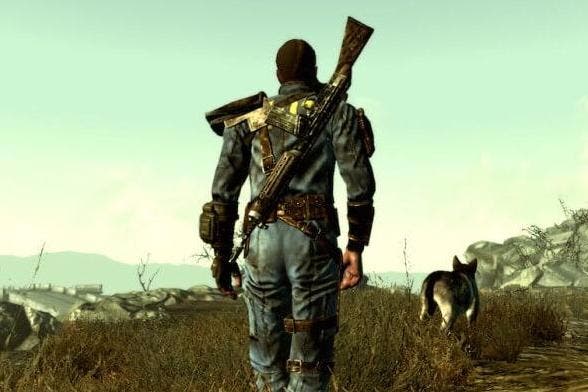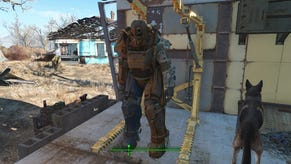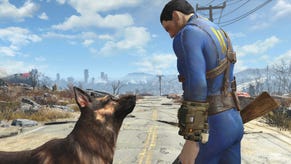Fallout 4 one year on
Who's still out there in the wasteland?
They said it was happening, and then it happened. Fallout 4, the third major entry in the celebrated retro-futuristic RPG series to be overseen by Bethesda, had just five months to lodge itself in the public consciousness following its June 2015 announcement. This was highly unorthodox.
By November, it was on shelves, or whatever the digital equivalent of a shelf is. Of Fallout 4's many deviations from Bethesda's norms (Skyrim took a year from announcement to release, and this was considered quick at the time), its narrow pre-release marketing window was perhaps our first indication that this trip to the wasteland would not be business as usual.
Less than a fortnight after its tantalising announcement trailer, Todd Howard took to the stage at Bethesda's first ever E3 conference. Fallout 4 looked, on the surface at least, to be much like its predecessors. Unsurprisingly, it was a higher-fidelity version of Fallout 3. All the old favourites were back - the daft Lost in Space robots, the farcical "Fat Man" miniature nukes. Riding a wave of optimism following the outrageously popular Skyrim and the runaway success of Fallout 3, the market couldn't have been more ready for Bethesda's next fantasy playground.
But things were different this time. The player character spoke their dialogue out loud - a Bethesda first. It's the sort of change for which the consequences aren't immediately clear, but just like the move to fully voiced NPCs a decade earlier with The Elder Scrolls IV: Oblivion, it meant scaling back on conversational dialogue. Fallout 4 would now use a Mass Effect-style conversation wheel to interact with NPCs, choosing the mood and tone of their responses rather than their specific content.
A year on, the community have grown disgruntled with this departure. It arguably makes role-playing more difficult, and certainly less precise. It immediately makes the player character less of a "blank canvas" than we're used to, a conundrum further entrenched by the fixed backstory. Before, Bethesda games placed you into their worlds with a smattering of situational context, but left the details vague - and your voice in your head. Suddenly, they were detailing everything from the sound of your character's voice to their marital and parental status.
This isn't necessarily an issue, and considering that Fallout 4 was a massive commercial success and is still in or near the top twenty most played games on Steam week after week, it didn't stop people having fun. Different isn't always worse. The knock-on effects are keenly felt in the modding community, though, a small fraction of the audience, but a highly vocal one - and a crucial one at this stage in a game's lifespan.
Single-player games have a hard ceiling on their longevity, unless content is constantly being pumped in. Bethesda can't crank out the DLC forever, so it now falls on modders to keep things interesting. This has been a quiet arrangement between Bethesda and its most determined fans ever since they provided "The TES Construction Set" with Morrowind - the in-house tools used to craft items, quests and characters. Keys to the factory, entrusted to a content-hungry public while HQ transfers to the next project.
Fallout 4 has an active modding community, with the top mods on NexusMods.com achieving in excess of a million downloads. But ambitious creatives who aren't content with tweaking the game's stats and aesthetics, who want to tell stories in its world, face a conundrum in deciding what happens when the player character speaks. There are two options - find a soundalike to do the voice acting (or two, to account for gender), or don't.
The issue isn't insurmountable, and story mods do exist, but not in great numbers. It's a problem that the more ambitious side of the modding community has never had before, and it reflects Fallout 4's most striking deviation from its predecessors: it casts you not as a tourist in its world, but as a tourist in the life of its main actor.
This may explain a relative lack of enthusiasm for the title when compared to Skyrim, which trundles on, still dipping in and out of the top twenty sales charts while celebrating its fifth birthday. Is excitement directly proportional to scope for self-expression? Looking at the obscene amounts of wealth and YouTube views generated by Minecraft, a game fundamentally about transporting cubes, it certainly seems so.
Skyrim's continued success has been helped by its recent remaster, of course, but it had barely showed signs of slowing down before. The original version is currently fighting with its own revamp in Steam's chart of top games by player count. After half a decade, that's quite an achievement.
Fallout 4 is further down that chart than either of them, although it maintains a respectable position.
And it's hard to imagine what its legacy will be. Every Bethesda RPG feeds its DNA into the next one. Traces of 1994's The Elder Scrolls: Arena can certainly be found in Skyrim. 2002's Morrowind established the modern template for its own series and that of Fallout going forward. Signature features and design principles from each release find their way into the next one. Even slow-motion VATS combat from Fallout 3 poked its head into the distinctly VATS-less Skyrim in the form of slow-motion killcams (which everyone surely turned off after they'd interrupted play more than a dozen times).
Will the next Elder Scrolls, confirmed to be on the way but not anytime soon, keep Fallout 4's voiced protagonist? Will it retain such a tight grip on the narrative, and further develop Bethesda's iffy take on BioWare's conversation and romancing system? And what of its construction features, arguably the most well-received of Fallout 4's innovations. Minecraft-style resource gathering and settlement building is such a great hook that even Dragon Quest had a go this year, so it seems likely that Fallout 4's interpretation will survive in some form.
Perhaps Fallout 4's legacy ultimately lies in how it changed Bethesda Game Studios. People used to make jokes about their predictability. Fallout 3 was "Oblivion with guns", Skyrim was "Fallout 3 with swords". Fallout 4's curveballs, regardless of how well received they've been, demonstrate an eagerness to take risks, and redraw the borders of a rigid template that has been key to the developer's success for well over a decade.
It will never outrun the shadow of Skyrim, but it has changed the rules of the race.

















